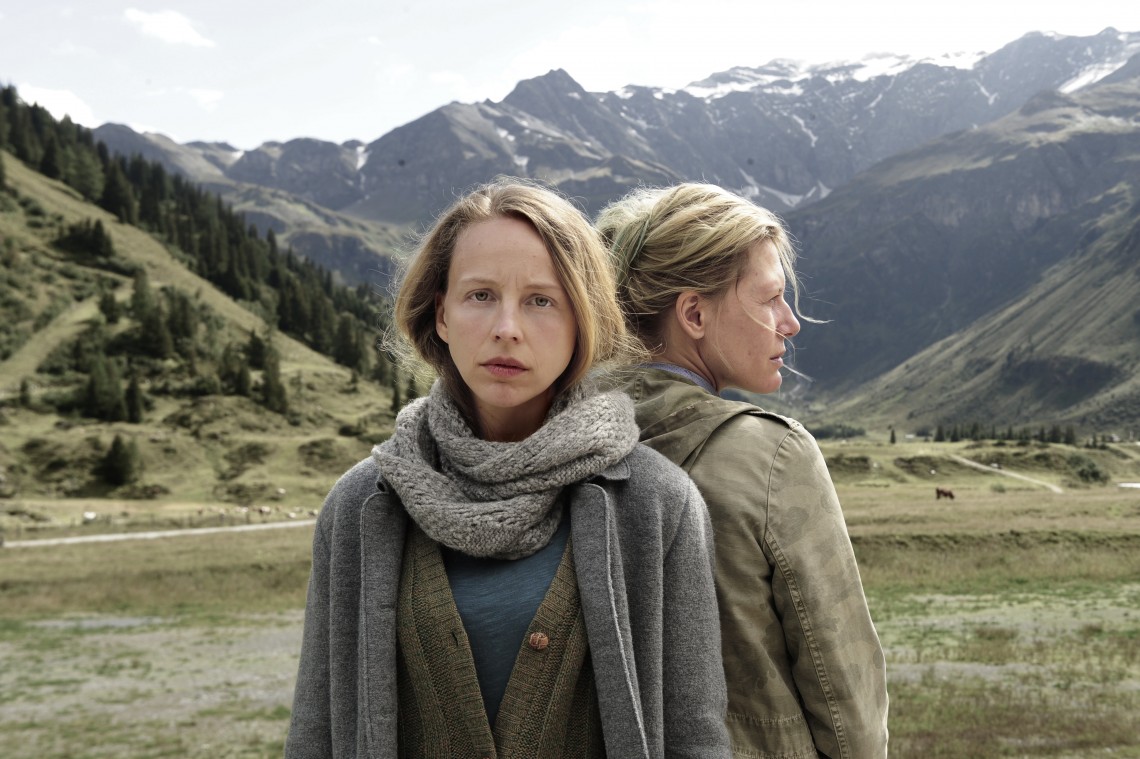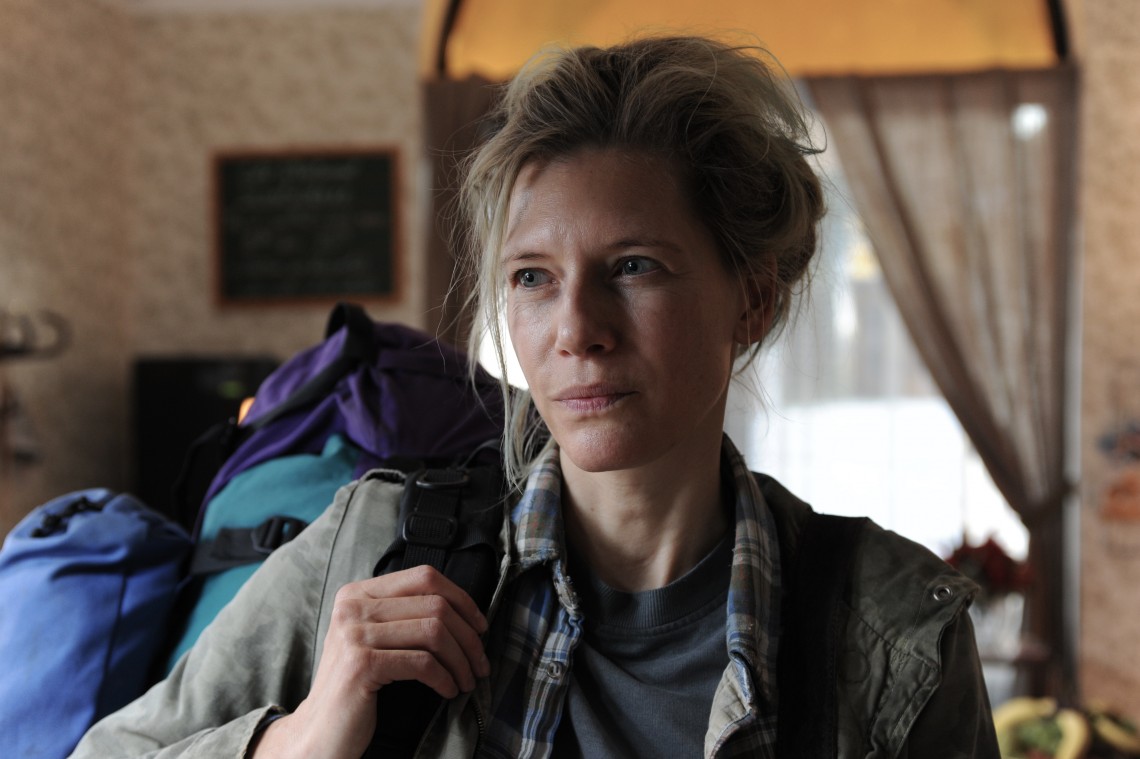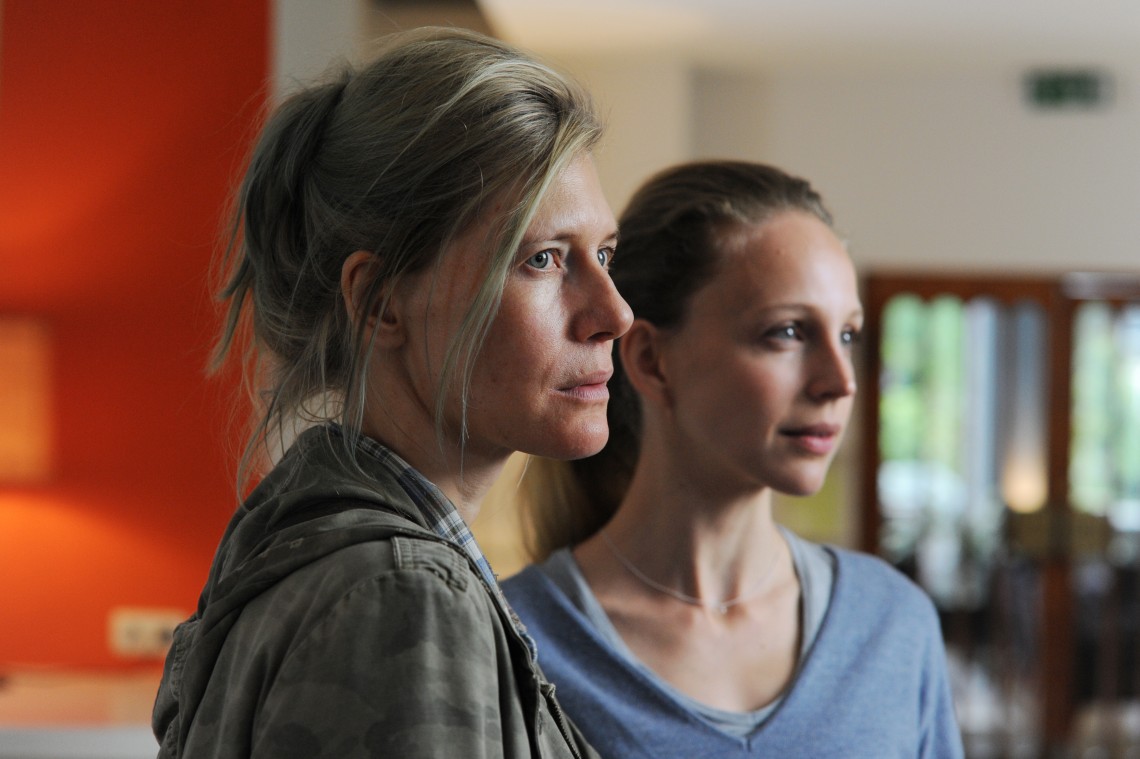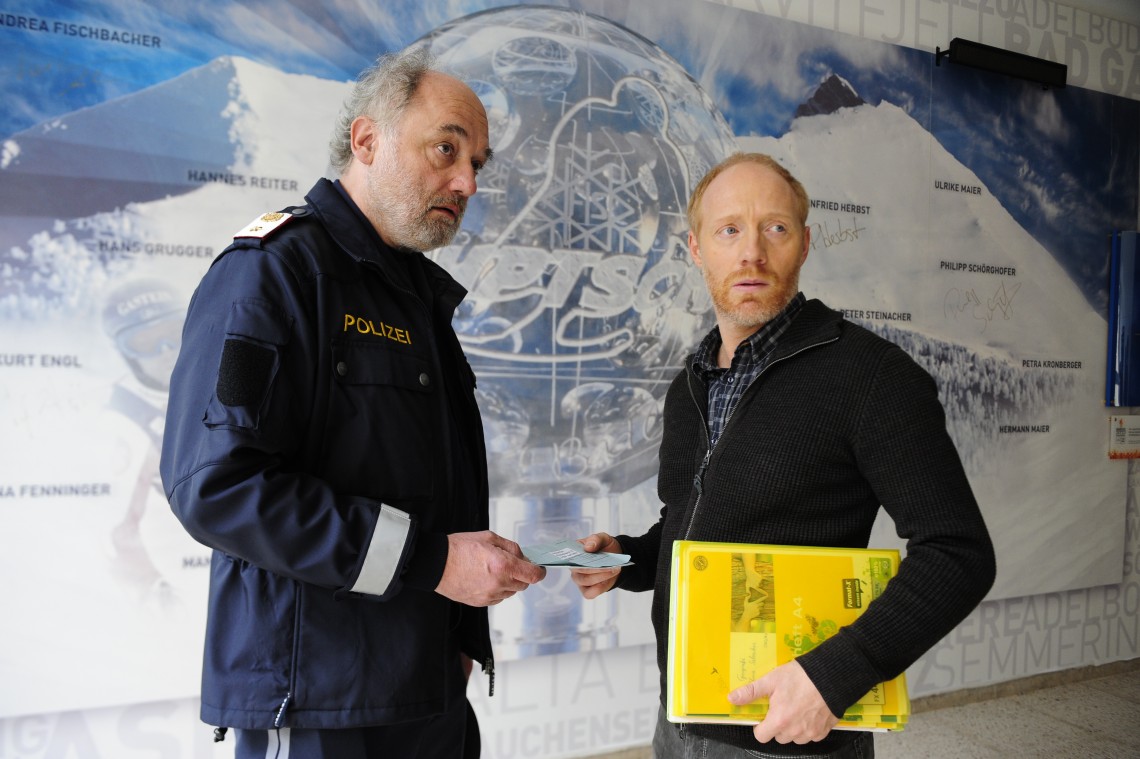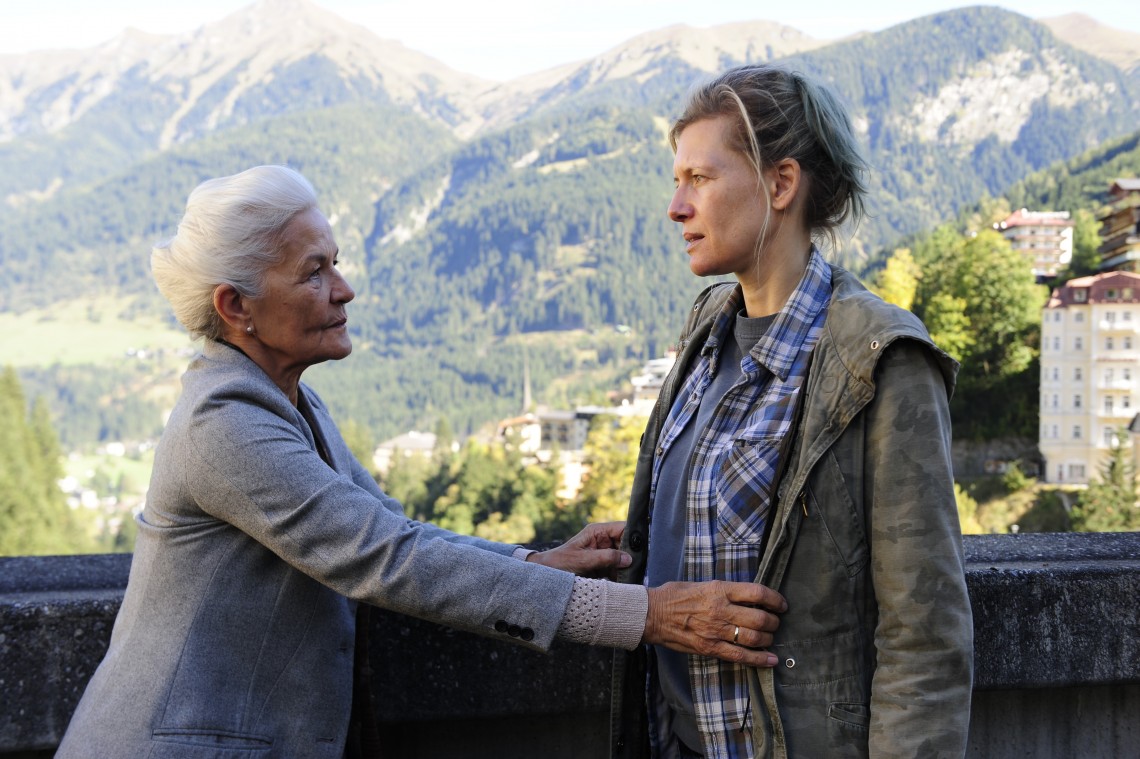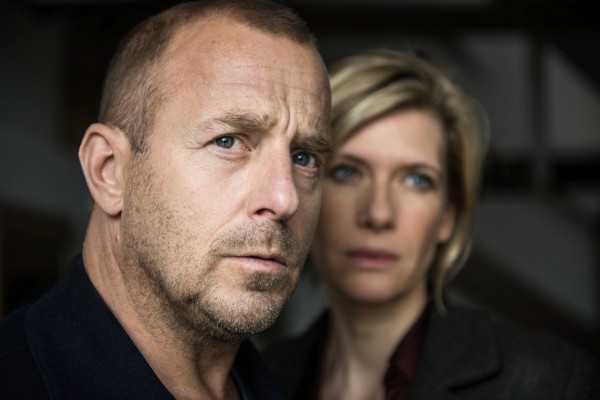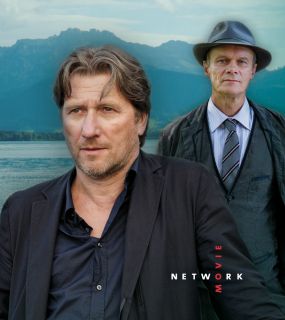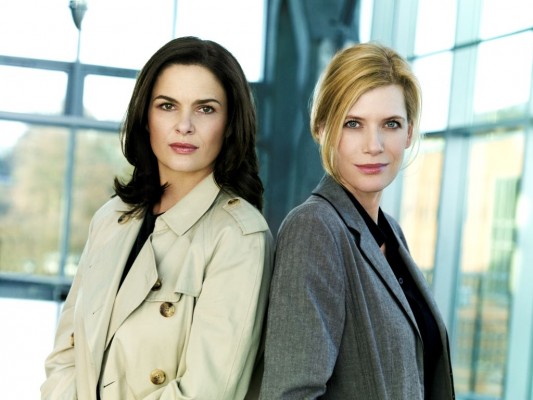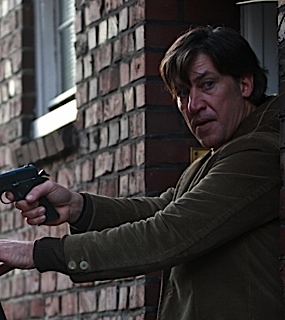- Runtime: 90'
- Viewers: 6,20 Mio. / 18,1 MA
- Press release PDF
A film by Hans Steinbichler from a screenplay by Martin Ambrosch starring Petra Schmidt-Schaller and Ina Weisse.
Eva (Petra Schmidt-Schaller) has been looking for her older sister Lydia (Ina Weisse) for years in vain, but suddenly she shows up in her hometown in the mountains and settles accounts with the family. A web of lies and betrayal opens up, the facade cracks, and the young woman threatens to stagger into nothingness.
A casual family dinner turns into bitter seriousness when Lydia returns to her hometown Bad Gastein after a long absence. No one has heard from her in decades, no one expected her to show up. The family’s joy turns to anger and incomprehension when Lydia uses her surprise return to settle accounts with people from her past. For Lydia accuses Christian, the fiancé of her younger sister Eva, of raping her when she was 14 years old. An event that abruptly ended her childhood and from which she had never really recovered. Rumors begin to spread in the village, and the family is stunned.
Eva is particularly hard hit by Lydia’s announcement: for decades she had sought contact with her sister in vain, suffering from the vague feeling that something essential was missing from her life. A feeling that perhaps only the sister can take away from her? Eva is torn between wanting to help the visibly unstable Lydia and at the same time trying to dissuade her from becoming even more entangled in her tall tales. Although no one in town wants to doubt the innocence of the popular teacher, the accusations soon have consequences: Christian, stigmatized by the rumors, threatens to lose his job.
And then Christian’s body is recovered from the raging river that has always divided the traditional village. The police assume it was a suicide and want to close the case. Eva, however, is firmly convinced that her sister drove Christian to his death and searches for evidence. The more intensively Eva then deals with her sister’s past, the more real her accusations become for her.
Secluded high in the mountains, a small spa town whose grand hotels from the Belle Epoque keep alive the very special charm of those times of splendor becomes the fateful location of an abysmal and subtly told drama. Martin Ambrosch (“Traces of Evil”, “The Dark Valley”) provided with his screenplay the template for an emotionally dense film in an archaic setting. The renowned and award-winning Hans Steinbichler, known for his psychologically differentiated and atmospherically charged films (“Hierankl,” “Winterreise,” “Bella Block,” “Hattinger – Der Chiemseekrimi”), came on board to direct. He himself grew up in the Alps and has already proven many times with his films that he is not interested in general genre guidelines. Instead, he understands like no one else how to uncover people’s stories with ever exciting cinematic means and with a sometimes almost merciless gaze. People and their dramas, which in turn cannot be understood without the landscape in which they live. People and their stories, which on closer inspection usually resemble an abyss.
The film has a top-class cast with actors Petra Schmidt-Schaller, Ina Weisse, Simon Schwarz, Hary Prinz, Helmuth Lohner and others. “Das Dorf des Schweigens” is a production of Network Movie Hamburg, Jutta Lieck-Klenke. Producer: Anne-Lena Dwyer, Producers: Jutta Lieck-Klenke and Dietrich Kluge. Produced with the support of the state of Salzburg. The editorial office at ZDF is in the hands of Daniel Blum.
-
Stab
Ein Film von Hans Steinbichler nach einem Drehbuch von Martin Ambrosch
Regie
Hans Steinbichler
Kamera
Bella Halben
Szenenbild
Heike Lange
Kostüm
Katharina Ost
Musik
Alex Komlew
Casting
Franziska Aigner
Montage
Wolfgang Weigl
Produktionsleitung
Andrea Bockelmann
Herstellungsleitung
Roger Daute
Producer
Anne-Lena Dwyer
Produzenten
Jutta Lieck-Klenke, Dietrich Kluge
Produktion
Network Movie, Hamburg
Redaktion
Daniel Blum
Die Darsteller
Petra Schmidt-Schaller
Ina Weisse
Simon Schwarz
Helmuth Lohner
Hary Prinz
Hildegard Schmahl
Karl Fischer
Doris Hindinger
u.a.
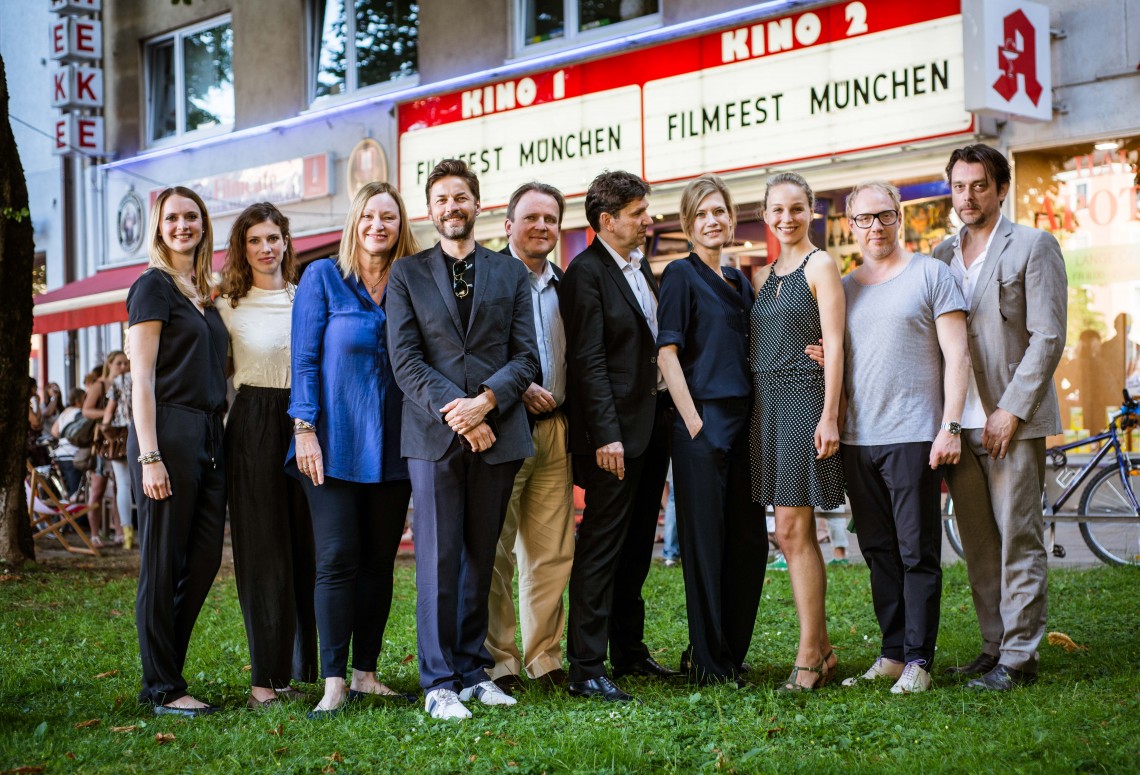 "Rabiat, unerbittlich und ohne Rücksicht…"
Interview mit Hans Steinbichler
Aus dem Mikrokosmos Familie entwickeln Sie immer wieder Filme, die – einer antiken Tragödie gleich – ein ganzes Universum an Liebe, Hass, Verrat, Neid, Lüge, Schuld, Manipulation und Lust auffächern. Wie sind Sie eigentlich vom Jurastudium zum Film gekommen?
Es gibt eine interessante Parallele zwischen der Juristerei und dem Machen eines Filmes, beziehungsweise der Erzählung einer Geschichte: Die Abstraktion des Gesetzes erlaubt es, jede Lebenswirklichkeit – und sei sie noch so abwegig – unter einen Paragraphen zu zwingen. Sprich: die ganze Welt in eine Form zu gießen, in der man sie dann betrachten kann. Das gleiche Verfahren, nur eben nicht statisch und abstrakt, sondern in tausendfachen Variationen und lebendig, erlaubt die Erzählung eines Filmes. Sie können eine ganze Welt in 90 Minuten erzählen. "Das Dorf des Schweigens" spielt alle Archetypen der griechischen Tragödie durch – und ist doch absolut heutig. Ich habe mich Anfang Zwanzig, obwohl ich durch die Fotographie und das Schreiben schon damals von der Welt des Erzählens absorbiert war, entschieden, meiner Leidenschaft eine Art Disziplinierung und Denkstruktur gegenüberzustellen. Und das war – in der maximal möglichen Abstraktion – das Jura-Studium. Diese Idee war aber eine bürgerliche Kopfgeburt und in einem sogenannten "lichten Moment" (einer Beschreibung aus dem Bürgerlichen Gesetzbuch) habe ich die Bücher zugeklappt und mich an der Filmhochschule beworben.
Auf welche Fälle hätten Sie sich spezialisiert, wenn Sie Anwalt geworden wären?
Es gibt im Recht kein Gefühl, sondern abstrakte Gesetzestexte für die Bewertung von Handlungen. Mich hat im Studium vor allem Aussichtsloses und Abwegiges interessiert und das findet man zumeist im Strafrecht. Ich habe in dieser Zeit beispielsweise Otto Schily, der Mitglieder der RAF verteidigte, bewundert. Und sich, wie jetzt die Verteidiger der Angeklagten des NSU, der Aussichtslosigkeit und den Grauen dieses Verfahrens zu stellen, finde ich absolut bemerkenswert.
Sie gelten als mutiger, kompromissloser und vollkommen unerschrockener Filmemacher, was wollen Sie in ihren Filmen erzählen?
Die Wahrheit.
Ist die Wahrheit den Menschen zumutbar?
Das ist die Frage, die der Film stellt: Ist die Wahrheit den Menschen zumutbar? Ja, denn Wahrheit ist objektiv und der Mensch muss sich ihr stellen. Man kann die Wahrheit nicht relativieren. Wenn Eva, die Protagonistin, zu Beginn des Films im Heilstollen tief im Innern des Bergs zu sehen ist, so ist dies ein einfaches Bild für ihren Zustand: sie bewegt sich in den Eingeweiden des Berges, aber sie versteht nicht, dass diese Nachtschwärze, die sie umgibt, ihr eigener blinder Fleck ist, dass diese Eingeweide ihre eigenen sind. Der Berg ist Evas Gefängnis. Aber wie befreit man sich aus einem Gefängnis, von dem man nicht weiß, dass es einen umschließt? Wie bewegt man sich im Nebel? Wie erlangt man Erkenntnis? Eva tastet sich blind, aber mit ungeheurer Kraft, Schritt für Schritt ins Herz einer Finsternis, die so tief wie schmerzhaft ist. Als sie dann die Dunkelheit durchmessen hat und ans Licht tritt, kommt dies einem "inneren Erblinden" gleich. Die Erkenntnis, der sie sich stellen muss, ist wie ein Blitz, der ungeschützt in sie einschlägt.
Sie lassen von einigen Figuren in Ihren Filmen nichts übrig, am Ende sind diese dann vollkommen zerstört, der Zuschauer wohnt einer "Apokalypse" bei. Würden Sie sich als moralischen Menschen bezeichnen?
Im Gegenteil. Ich würde mich als amoralisch bezeichnen. Beim Erzählen ist die Moral ein Stolperstein, der die Geschichte am Laufen hindert. Gerade die bösen Figuren in den Geschichten haben meine volle Aufmerksamkeit und meinen Rückhalt. Die Figur der Mutter in "Das Dorf des Schweigens", gespielt von Hildegard Schmahl, habe ich in jeder ihrer Handlungen innerlich verteidigt. Das ist ein Instrument, um beim Erzählen und Inszenieren präzise zu sein. Den Guten nimmt man alles ab, die vermeintlich Bösen müssen demgegenüber äußerst genau gezeichnet sein.
Was werfen Sie der Nachkriegs-Generation vor?
Für mich als jemanden, der am liebsten von Lügen und Geheimnissen – im Prinzip von der Unfähigkeit, miteinander zu sprechen und sich auszutauschen – erzählt, ist die Nachkriegsgeneration natürlich ein schier unerschöpfliches Reservoir. Denn es ist die Generation des Schweigens. Insofern habe ich in dieser Generation (meines Vaters) das Material und die Geschichten gefunden, über die es sich zu erzählen lohnt. Es ist mir darüber hinaus total fern, eine Generation unter einem moralischen Aspekt zu beleuchten oder gar zu bewerten. Ich glaube, dass sich unsere Generation in Bezug auf den Zustand der gesamten Welt härteren und unnachgiebigeren Fragen stellen werden muss, als dies bei der Generation nach dem Zweiten Weltkrieg der Fall war und ist.
Mögen Sie Familientraditionen und Rituale?
Die Heimatlosigkeit in unserer Welt ist derart und umfassend, dass Traditionen und Rituale der letzte Strohhalm sind, an dem man sich in einer zunehmend fremden und sich rasend schnell verändernden Umwelt festhalten kann. Rituale sind zudem dem Zugriff von außen entzogen und können daher auch weitgehend unverändert weitergegeben werden. Sie werden in dieser Welt immer wichtiger werden. Wir versuchen sie zu pflegen.
Es heißt "Schweigen ist Macht, Schweigen ist Kommunikation". Werden die beiden Frauen heile da raus kommen können? Wie?
Schweigen ist vor allem Macht. Und für den, der nichts erfährt, Ohnmacht. Dieses Schweigen wird in "Das Dorf des Schweigens" sukzessive gebrochen. Rabiat, unerbittlich und ohne Rücksicht auf Familie, Gesellschaft und die Interessen des Einzelnen. Und so stehen die Schwestern Eva und Lydia Perner am Ende des Filmes vor den Trümmern ihres Lebens – und sind doch frei.
Das Interview führte Claudia Maxelon (Auszug aus der digitalen Pressemappe des ZDF)
"Rabiat, unerbittlich und ohne Rücksicht…"
Interview mit Hans Steinbichler
Aus dem Mikrokosmos Familie entwickeln Sie immer wieder Filme, die – einer antiken Tragödie gleich – ein ganzes Universum an Liebe, Hass, Verrat, Neid, Lüge, Schuld, Manipulation und Lust auffächern. Wie sind Sie eigentlich vom Jurastudium zum Film gekommen?
Es gibt eine interessante Parallele zwischen der Juristerei und dem Machen eines Filmes, beziehungsweise der Erzählung einer Geschichte: Die Abstraktion des Gesetzes erlaubt es, jede Lebenswirklichkeit – und sei sie noch so abwegig – unter einen Paragraphen zu zwingen. Sprich: die ganze Welt in eine Form zu gießen, in der man sie dann betrachten kann. Das gleiche Verfahren, nur eben nicht statisch und abstrakt, sondern in tausendfachen Variationen und lebendig, erlaubt die Erzählung eines Filmes. Sie können eine ganze Welt in 90 Minuten erzählen. "Das Dorf des Schweigens" spielt alle Archetypen der griechischen Tragödie durch – und ist doch absolut heutig. Ich habe mich Anfang Zwanzig, obwohl ich durch die Fotographie und das Schreiben schon damals von der Welt des Erzählens absorbiert war, entschieden, meiner Leidenschaft eine Art Disziplinierung und Denkstruktur gegenüberzustellen. Und das war – in der maximal möglichen Abstraktion – das Jura-Studium. Diese Idee war aber eine bürgerliche Kopfgeburt und in einem sogenannten "lichten Moment" (einer Beschreibung aus dem Bürgerlichen Gesetzbuch) habe ich die Bücher zugeklappt und mich an der Filmhochschule beworben.
Auf welche Fälle hätten Sie sich spezialisiert, wenn Sie Anwalt geworden wären?
Es gibt im Recht kein Gefühl, sondern abstrakte Gesetzestexte für die Bewertung von Handlungen. Mich hat im Studium vor allem Aussichtsloses und Abwegiges interessiert und das findet man zumeist im Strafrecht. Ich habe in dieser Zeit beispielsweise Otto Schily, der Mitglieder der RAF verteidigte, bewundert. Und sich, wie jetzt die Verteidiger der Angeklagten des NSU, der Aussichtslosigkeit und den Grauen dieses Verfahrens zu stellen, finde ich absolut bemerkenswert.
Sie gelten als mutiger, kompromissloser und vollkommen unerschrockener Filmemacher, was wollen Sie in ihren Filmen erzählen?
Die Wahrheit.
Ist die Wahrheit den Menschen zumutbar?
Das ist die Frage, die der Film stellt: Ist die Wahrheit den Menschen zumutbar? Ja, denn Wahrheit ist objektiv und der Mensch muss sich ihr stellen. Man kann die Wahrheit nicht relativieren. Wenn Eva, die Protagonistin, zu Beginn des Films im Heilstollen tief im Innern des Bergs zu sehen ist, so ist dies ein einfaches Bild für ihren Zustand: sie bewegt sich in den Eingeweiden des Berges, aber sie versteht nicht, dass diese Nachtschwärze, die sie umgibt, ihr eigener blinder Fleck ist, dass diese Eingeweide ihre eigenen sind. Der Berg ist Evas Gefängnis. Aber wie befreit man sich aus einem Gefängnis, von dem man nicht weiß, dass es einen umschließt? Wie bewegt man sich im Nebel? Wie erlangt man Erkenntnis? Eva tastet sich blind, aber mit ungeheurer Kraft, Schritt für Schritt ins Herz einer Finsternis, die so tief wie schmerzhaft ist. Als sie dann die Dunkelheit durchmessen hat und ans Licht tritt, kommt dies einem "inneren Erblinden" gleich. Die Erkenntnis, der sie sich stellen muss, ist wie ein Blitz, der ungeschützt in sie einschlägt.
Sie lassen von einigen Figuren in Ihren Filmen nichts übrig, am Ende sind diese dann vollkommen zerstört, der Zuschauer wohnt einer "Apokalypse" bei. Würden Sie sich als moralischen Menschen bezeichnen?
Im Gegenteil. Ich würde mich als amoralisch bezeichnen. Beim Erzählen ist die Moral ein Stolperstein, der die Geschichte am Laufen hindert. Gerade die bösen Figuren in den Geschichten haben meine volle Aufmerksamkeit und meinen Rückhalt. Die Figur der Mutter in "Das Dorf des Schweigens", gespielt von Hildegard Schmahl, habe ich in jeder ihrer Handlungen innerlich verteidigt. Das ist ein Instrument, um beim Erzählen und Inszenieren präzise zu sein. Den Guten nimmt man alles ab, die vermeintlich Bösen müssen demgegenüber äußerst genau gezeichnet sein.
Was werfen Sie der Nachkriegs-Generation vor?
Für mich als jemanden, der am liebsten von Lügen und Geheimnissen – im Prinzip von der Unfähigkeit, miteinander zu sprechen und sich auszutauschen – erzählt, ist die Nachkriegsgeneration natürlich ein schier unerschöpfliches Reservoir. Denn es ist die Generation des Schweigens. Insofern habe ich in dieser Generation (meines Vaters) das Material und die Geschichten gefunden, über die es sich zu erzählen lohnt. Es ist mir darüber hinaus total fern, eine Generation unter einem moralischen Aspekt zu beleuchten oder gar zu bewerten. Ich glaube, dass sich unsere Generation in Bezug auf den Zustand der gesamten Welt härteren und unnachgiebigeren Fragen stellen werden muss, als dies bei der Generation nach dem Zweiten Weltkrieg der Fall war und ist.
Mögen Sie Familientraditionen und Rituale?
Die Heimatlosigkeit in unserer Welt ist derart und umfassend, dass Traditionen und Rituale der letzte Strohhalm sind, an dem man sich in einer zunehmend fremden und sich rasend schnell verändernden Umwelt festhalten kann. Rituale sind zudem dem Zugriff von außen entzogen und können daher auch weitgehend unverändert weitergegeben werden. Sie werden in dieser Welt immer wichtiger werden. Wir versuchen sie zu pflegen.
Es heißt "Schweigen ist Macht, Schweigen ist Kommunikation". Werden die beiden Frauen heile da raus kommen können? Wie?
Schweigen ist vor allem Macht. Und für den, der nichts erfährt, Ohnmacht. Dieses Schweigen wird in "Das Dorf des Schweigens" sukzessive gebrochen. Rabiat, unerbittlich und ohne Rücksicht auf Familie, Gesellschaft und die Interessen des Einzelnen. Und so stehen die Schwestern Eva und Lydia Perner am Ende des Filmes vor den Trümmern ihres Lebens – und sind doch frei.
Das Interview führte Claudia Maxelon (Auszug aus der digitalen Pressemappe des ZDF)
